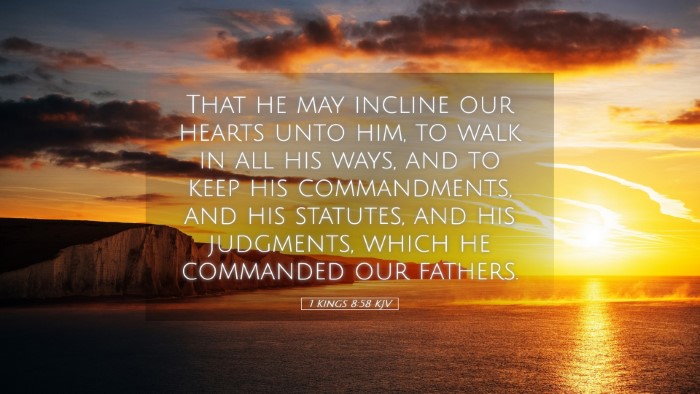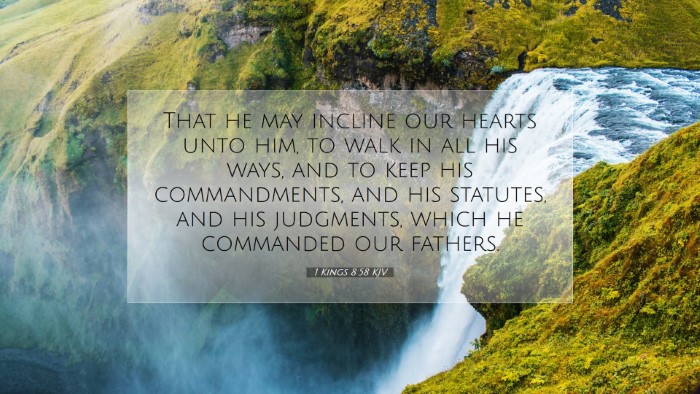Commentary on 1 Kings 8:58
Verse: "That He may incline our hearts unto Him, to walk in all His ways, and to keep His commandments, and His statutes, and His judgments, which He commanded our fathers." (1 Kings 8:58, KJV)
Introduction
The passage in 1 Kings 8:58 serves as a crucial reflection on the covenant relationship between God and His people, articulated during the dedication of Solomon’s temple. This commentary draws insights from public domain sources, including the works of Matthew Henry, Albert Barnes, and Adam Clarke, to provide a comprehensive understanding of this significant verse.
Contextual Background
1 Kings 8 captures a pivotal moment in Israel's history: the completion of the temple, Solomon’s prayer of dedication, and the public acknowledgment of God's covenant faithfulness. This verse specifically falls within Solomon's intercessory prayer, emphasizing both the communal and individual heart response required of the people of Israel.
Exegesis
God's Inclination of Hearts:
- According to Matthew Henry, the "inclination" of hearts is a divine work. It implies that, while humans possess the responsibility to choose, ultimately it is God who influences and turns the heart toward Him. This notion emphasizes God’s sovereignty in salvation and obedience.
- Albert Barnes notes that this petition reflects the understanding that human hearts are prone to wander and that divine intervention is necessary for true devotion. It speaks to the need for continual reliance on God’s grace to fulfill His commandments.
- Adam Clarke expands on this, emphasizing that inclining one's heart suggests a deliberate act of will, but one that is facilitated by divine influence. Clarke connects this to the New Testament understanding of regeneration, wherein the believer’s heart is reoriented towards God through the Holy Spirit.
The Call to Walk in His Ways:
- Walking in God's ways implies a life of active obedience. Henry asserts that this is not merely passive acceptance but a dynamic engagement with God’s commandments.
- Barnes highlights that "to walk" denotes a consistent lifestyle rather than occasional acts of piety, showcasing the expectations of sanctified living among God's chosen people.
- Clarke remarks that such a walk involves not just adherence to the law but cultivating a relationship with God that impacts every aspect of life, aligning actions with divine principles.
Keeping His Commandments:
- This phrase reflects Israel's covenant relationship with God. According to Henry, keeping God's commandments is both a privilege and a duty for God's people, marking their distinct identity.
- Barnes stresses that the commandments given were both ethical and ceremonial, highlighting the holistic nature of obedience that includes one's inner disposition and outward practices.
- Clarke emphasizes the profundity in the understanding of commandments—they are for the benefit of the people, meant to guide them towards a flourishing life in God's presence.
The Integration of Statutes and Judgments:
- Henry remarks that "statutes" pertain to the formal regulations established by God, while "judgments" refer to the legal decisions and interpretations of God's laws. Together, they provide a comprehensive blueprint for living.
- Barnes indicates that this differentiation signifies the multifaceted nature of God's guidance, indicating that the law encompasses not only moral directives but also regulations that govern community life.
- Clarke adds that the commitment to these statutes signifies a deep recognition of God’s authority in all aspects of life, encouraging a societal structure influenced by divine wisdom.
Theological Implications
1 Kings 8:58 encapsulates a prayerful desire for alignment with God’s will, emphasizing the need for divine assistance in maintaining faithfulness to both the letter and spirit of God's Law. This presents several theological implications:
- Covenantal Relationship: The mutuality in the plea highlights the nature of covenantal relationships—God's faithfulness intertwined with human obedience.
- Sovereignty and Human Responsibility: The verse exemplifies the dynamic tension between divine sovereignty in inclining hearts and the human responsibility to respond to God's guidance.
- Sanctification: This request underscores the pastoral theme of sanctification, where believers are called to ongoing growth in holiness through reliance on the Holy Spirit’s work in their lives.
Practical Applications for Believers
The insights drawn from 1 Kings 8:58 offer several actionable takeaways for contemporary believers:
- Regular Reflection: Engage in self-examination and prayer, asking God to align one's heart with His, mirroring Solomon's plea.
- Active Obedience: Emphasize living in a way that reflects God's commandments in daily life, understanding that obedience is not burdensome but a part of a loving relationship with God.
- Community Commitment: Encourage communities to gather and seek God together, fostering environments where hearts are inclined toward God and His will.
- Trust in Divine Guidance: Cultivate a trust in God’s power to direct and guide, reminding ourselves that divine inclination is a necessary aspect of faithfulness.
Conclusion
1 Kings 8:58 serves as a profound reminder of the necessity of divine intervention in the lives of God's people. It is a testament to the grace that undergirds our ability to walk in obedience, maintain faithfulness to God's commandments, and ultimately live lives that reflect His glory. May this verse encourage pastors, students, theologians, and scholars to explore the depths of their commitment to God, invoking a heart that seeks Him earnestly.


